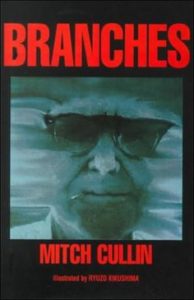 By MITCH CULLIN (The Permanent Press; 2000)
By MITCH CULLIN (The Permanent Press; 2000)
Mitch Cullin is perhaps best known for providing the source novel for Terry Gilliam’s Southern-fried “PSYCHO-meets-DAYS OF HEAVEN” reverie TIDELAND (2005), and this earlier Cullin text is just as twisted. Written entirely in poetic verse, it’s a depiction of madness and outrage set, once again, in Southern America.
The narrator is Sherriff Branches, a character whose exploits bring to mind THE KILLER INSIDE ME and BAD LIEUTENANT. The book opens with Branches tossing his stepson Danny into a well, which is already occupied by the moldering corpses of two Mexicans—both put there by Branches.
Much of the remainder of the novel consists of an extended flashback detailing Branches’ life in King County, TX. Branches, we learn, loves beef burritos, as well as dogs, beer and AMERICA’S FUNNIEST HOME VIDEOS. He also has a most unfortunate habit of beating prisoners senseless, and even shooting and raping them on occasion, as “Justice has my grin/plastered all over it.” Then there’s the young woman whose body language Branches misreads, believing she’s coming onto him; Branches’ resulting actions (which he admits are a “mistake”) aren’t pretty, and nor is the ultimate resolution, which like the rest of the book pulls no punches and makes no concessions.
We learn how Branches became the way he is, via childhood flashbacks marked by horrific abuse and aggression. Danny, it seems, is on a course disturbingly similar to that of his stepfather, growing into a sullen neo-Nazi asshole—which explains, in part, the shocking actions taken by Branches in the opening chapter.
The novel’s frank depiction of the mindset of its psychopathic protagonist (“To make right,/a fella has to get muddy/every so often./He’s got to catch hold/of a problem/before it becomes a problem”) is its foremost distinction. The gritty portrayal of the rural Texas landscapes (“Dust devils/whip the ground,/whisk the russet earth/toward the judging sky”) is another standout element. Those two things collide in a story that also provides a bleak depiction of police corruption and skewed morality, issues that despite this book’s 2000 publication couldn’t be timelier.
